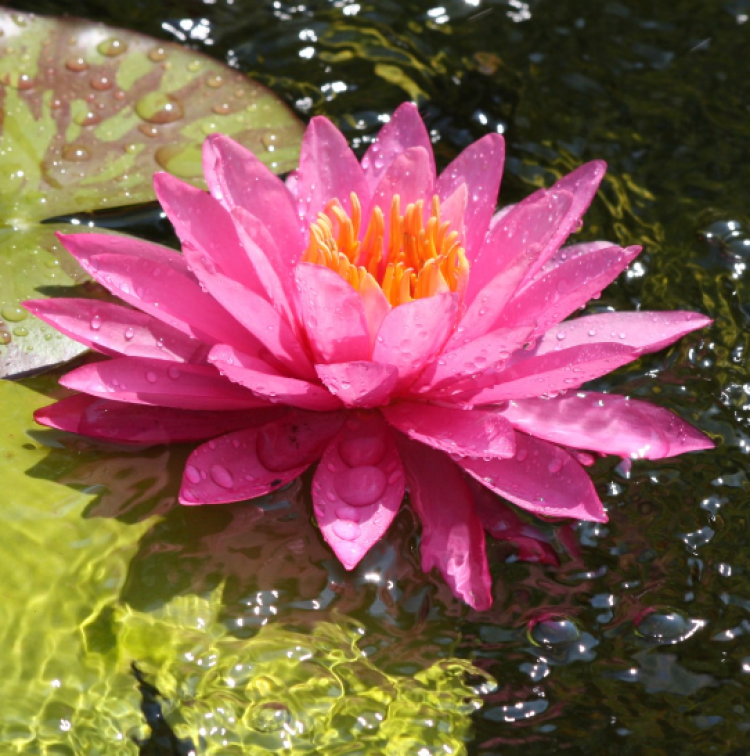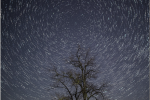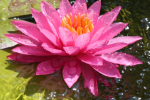In Tokyo, the side streets are barely more than cemented single-lane footpaths. They wind aimlessly back into the bowels of the city. Not a slice of sky separates one building from another down these narrow, sinuous ways. Back there, the density of population, the smothering admixture of architecture from totally distinct historical periods, and the very concentration of people andbuildings crowd the spirit.
But inside the new and towering skyscrapers, it is different. Tiny Japanese gardens, fountains flowing, draw visitors into intricate patterns of rock gardens and fish-filled canals that wind their way past miniature temples, around mounds of manicured grasses, and through bantam copses of toy trees.
The gardens touch up against the sterile offices that surround them, stilling all the noise, giving soul to the crush of humanity that pours through the commercial center of the city.
Unlike their Japanese counterparts, the lobby and core of a skyscraper in the United States is commonly spacious, filled with furniture and displays, service centers, and a confluence of coffee shops and lunch counters, gift stores, and banquet rooms. What they do not have that the Japanese provide for assiduously is emptiness.
The meeting place for our session in Tokyo, they told me, was through the double doors to the left of the elevator. I was not surprised to find the elevator padded with brass-studded leather.
The fact that the carpet in the corridor was thick and soft seemed usual enough. The real surprise, however, was that beyond the heavy oak doors, the meeting room was not the average conference room of large round tables and fold-up metal chairs flung from one end of the room to the other.
Instead, there was nothing in this maroon and gold draped room but one needle-nosed red celadon vase that held one fresh yellow rose.
One rose in one vase on a glass table in the middle of a room draped in red and gold velvet. Nothing but pure mindfulness, pure reverence, pure life.
This room, you had to think, had been built for this one vase and this single rose. The stark attention, the sentinel awareness, the utterly concentrated focus on one rose steeped the room in the consciousness of beauty.
THURSDAY, MAY 1: Mindfulness, the awareness of the sacredness of the details of life, makes haste and trumpery impossible. It makes every act a sacred act.
FRIDAY, MAY 2: Details are the small things that make the important things important: the extra cherry on the birthday cake, the twist of the wrist in ballet, the deep blue in the painting, the cocked head on the dog. “Love’s first step,” the philosopher Simone Weil wrote, “is attention.”
SATURDAY, MAY 3: Learning to be outside in a world of inside activities is the ultimate spiritual freedom.
SUNDAY, MAY 4: The monastics of the desert told a story about St. Antony. “Abba,” someone asked Antony, “how can you be enthusiastic when the comfort of books has been taken away from you?” And Antony replied, “My book, O Philosopher, is the nature of created things. Whenever I want to read the word of God, it is usually right in front of me.”
MONDAY, MAY 5: Raised to think about the next world for the sake of religion, we far too often forget about this one for the sake of deepening our spirituality. But the writer Pearl Buck was not fooled. “I am so absorbed in the wonder of the earth and life upon it,” she said, “that I cannot think of heaven and the angels. I have enough for this life.”
TUESDAY, MAY 6: The Creator is in the creation. Nikos Kazantzakis puts it this way: “God changes appearances every second. Blessed is the one who can recognize God in all God’s disguises. One moment God is a glass of fresh water; the next, your son bouncing on your knees, or an enchanting woman, or perhaps merely a morning walk.” Enjoy them all.
WEDNESDAY, MAY 7: We know that we have lost touch with creation because we have come to the point where we can demolish it with cavalier abandon. “The more clearly we can focus our attention on the wonders and realities of the universe around us,” Rachel Carson wrote, “the less taste we shall have for destruction.”
THURSDAY, MAY 8: How could it be that we have come to spend more time concentrating on the life we left behind than on the future we are creating for others? “We do not inherit the earth from our ancestors,” a Native American proverb reminds us, “we borrow it from our children.”
FRIDAY, MAY 9: There is something lacking in the soul of a people whose only time frame is now.
SATURDAY, MAY 10: There is an entire dimension of life to be developed in me if I have no care for what has come to me from the past, no concern for passing it on to the future even better than I received it.
SUNDAY, MAY 11: To recognize the beauty of the natural saves us from swamping our lives in the detritus of falsehood and pretense. One homely houseplant is worth all the plastic flowers in the world.
MONDAY, MAY 12: To turn a river into a cesspool, to use up the land by force-feeding it with chemicals that ironically leave it sterile in the end—this is to make ourselves God, a false one. “What good is a house,” Henry David Thoreau wrote, “if you haven’t got a tolerable planet to put it on?”
TUESDAY, MAY 13: Nothing is more difficult than to appreciate the obvious—and nothing is more necessary on any level. “When the well’s dry,” Benjamin Franklin wrote, “we know the worth of water.”
WEDNESDAY, MAY 14: The wars of the next century, it is said, will not be fought over oil. They will be fought over water. But whether oil or water, both wars begin in us seeking more than we need.
THURSDAY, MAY 15: How can we possibly say that these issues have nothing to do with us? As Shakespeare says, “One touch of nature makes the whole world kin.”
FRIDAY, MAY 16: To be whole ourselves, we must make the effort it requires to understand what is happening to the world. Then, we must make the effort to change our own lives in ways that begin to reverse the damage.
SATURDAY, MAY 17: Though we stand at the top of the food chain, the irony is that if the inability of nature to sustain life continues at its present rate, we will be the first to go. René J. Dubos warns us: “The belief that we can manage the Earth and improve on Nature is probably the ultimate expression of human conceit, but it has deep roots in the past and is almost universal.”
SUNDAY, MAY 18: Once people lived on the land. Now most people live in the cities. We have not only forgotten who we are but what we are.
MONDAY, MAY 19: Citizens of a technological world, we live in a virtual world where real tulips do not grow and we are not encouraged to go find one. You can’t help but wonder what part of the soul is shriveling as a result.
TUESDAY, MAY 20: We are not only the part of nature that depends on the land, we are also the people on whom the land depends as well. It is the covenant of life—and we are breaking it.
WEDNESDAY, MAY 21: We are all miracles living on a miracle called the earth. It is only a matter of coming to recognize what that means, both to us and to the rest of the people of the world. Thich Nhat Hanh says of it, “The miracle is not to walk on water. The miracle is to walk on the green earth in the present moment, to appreciate the peace and beauty that are available now.”
THURSDAY, MAY 22: It is learning to care for life that changes the life of the one who cares. It brings us into contact with the essentials. It reduces our addictions to money, to things, to glitz and bling and plastic.
FRIDAY, MAY 23: It is never too late to learn to be human: plant a tree, start vegetables in a window box, walk on the beach and pick up debris. The mandate still remains: “Till the earth and keep it.”
SATURDAY, MAY 24: The major economic lesson of life is a simple one: Nothing in life is useless. And yet, how much of it do we treat as trash—and so make it unavailable to others?
SUNDAY, MAY 25: Because we live in worlds made of cement and plastic, we stand to lose a real relationship with the world itself. We can live our hermetically sealed lives, away from the thinning oceans and the burned out fields. We never see the results of the human footprints we all leave behind. We forget William Wordsworth and his plea: "Come forth into the light of things. Let Nature be your teacher.”
MONDAY, MAY 26: It is the technological world that exhausts us, that stresses us, that leaves us totally depleted after a day of sitting at a desk. Try living a natural cycle just one day a week: go to bed shortly after it gets dark; get up with the sun. Find out what changes in your life, as a result.
TUESDAY, MAY 27: Everything we ever learned about being independent is a lie. Or, as John Muir puts it, “When one tugs at a single thing in nature, he finds it attached to the rest of the world.”
WEDNESDAY, MAY 28: Every one of us needs a bit of wilderness, just to keep us human. “Wilderness reminds us,” Terry Tempest Williams writes, “what it means to be human, what we are connected to rather than what we are separate from.”
THURSDAY, MAY 29: Focusing on one thing in nature every day–one rose in a beautiful vase, one old tree gnarled but indomitable, one rugged mountain range undiminished by time, or whatever it is that calls us to reverence the mystery that is life–is meditation enough to make life precious whatever its stressors.
FRIDAY, MAY 30: Failing to notice one rose, we fail to notice the entire cosmos. We erode the earth under our feet and the air around us without even knowing that it is happening. We poison ourselves and have not a clue what culprit is doing it. “A nation that destroys its soils destroys itself,” President Teddy Roosevelt wrote. “Forests are the lungs of our land, purifying the air and giving fresh strength to our people.” Let those who have ears to hear, hear.
LET’S SHARE OUR THOUGHTS
The following discussion questions, Scripture echo, journal prompts, and prayer are meant to help you reflect more deeply on The Monastic Way. Choose at least two suggestions and respond to them. You may do it as a personal practice or gather a group interested in sharing the spiritual journey.
DISCUSSION QUESTIONS
1. When do you find yourself naturally feeling reverence? Does nature inspire reverence in you? Be specific about the places and times that give you the sense of awe, beauty, and appreciation? Can you invite someone to go there with you, or look at photographs of that place together and share in being grateful for it?
2. Which daily quote in The Monastic Way is most meaningful to you? Why? Do you agree with it? Disagree? Did it inspire you? Challenge you? Raise questions for you?
3. After reading The Monastic Way, write one question that you would like to ask the author about this month’s topic.
4. Joan Chittister uses other literature to reinforce and expand her writing. Find another quote, poem, story, song, art piece, novel that echoes the theme of this month’s Monastic Way.
5. On May 22, Sister Joan writes, “It is learning to care for life that changes the life of the one who cares.” When have you cared for life—in nature, in another person, or in an animal—in a way that changed you?
JOURNAL PROMPTS
Prompt 1: Here are a few statements from this month’s Monastic Way. Choose one that is most helpful to you and journal with it.
• There is something lacking in the soul of a people whose only time frame is now.
• Everything we ever learned about being independent is a lie.
• Every one of us needs a bit of wilderness, just to keep us human.
Prompt 2: Spend a few minutes with this photograph and journal about its relationship to this month’s Monastic Way. You can do that with prose or a poem or a song or....
SCRIPTURE ECHO
Praise be to the name
of God for ever and ever;
wisdom and power are God’s.
God changes times and seasons;
deposes rulers and raises up others,
giving wisdom to the wise
and knowledge to the discerning.
God reveals deep and hidden things;
and knows what lies in darkness,
for all light dwells with God.
—Daniel 2:21-22

 Artwork: Lotus by Jo Clarke
Artwork: Lotus by Jo Clarke




